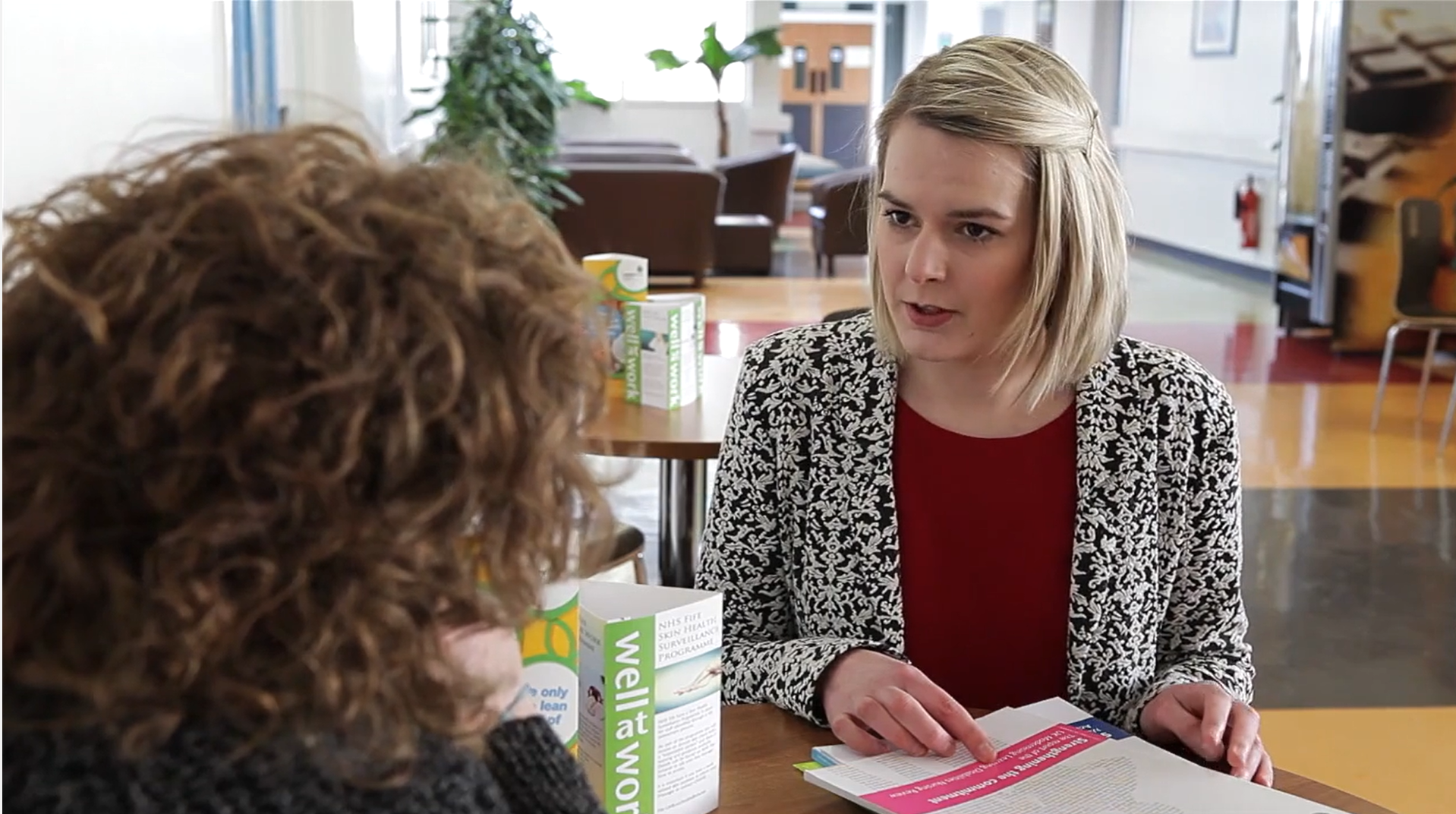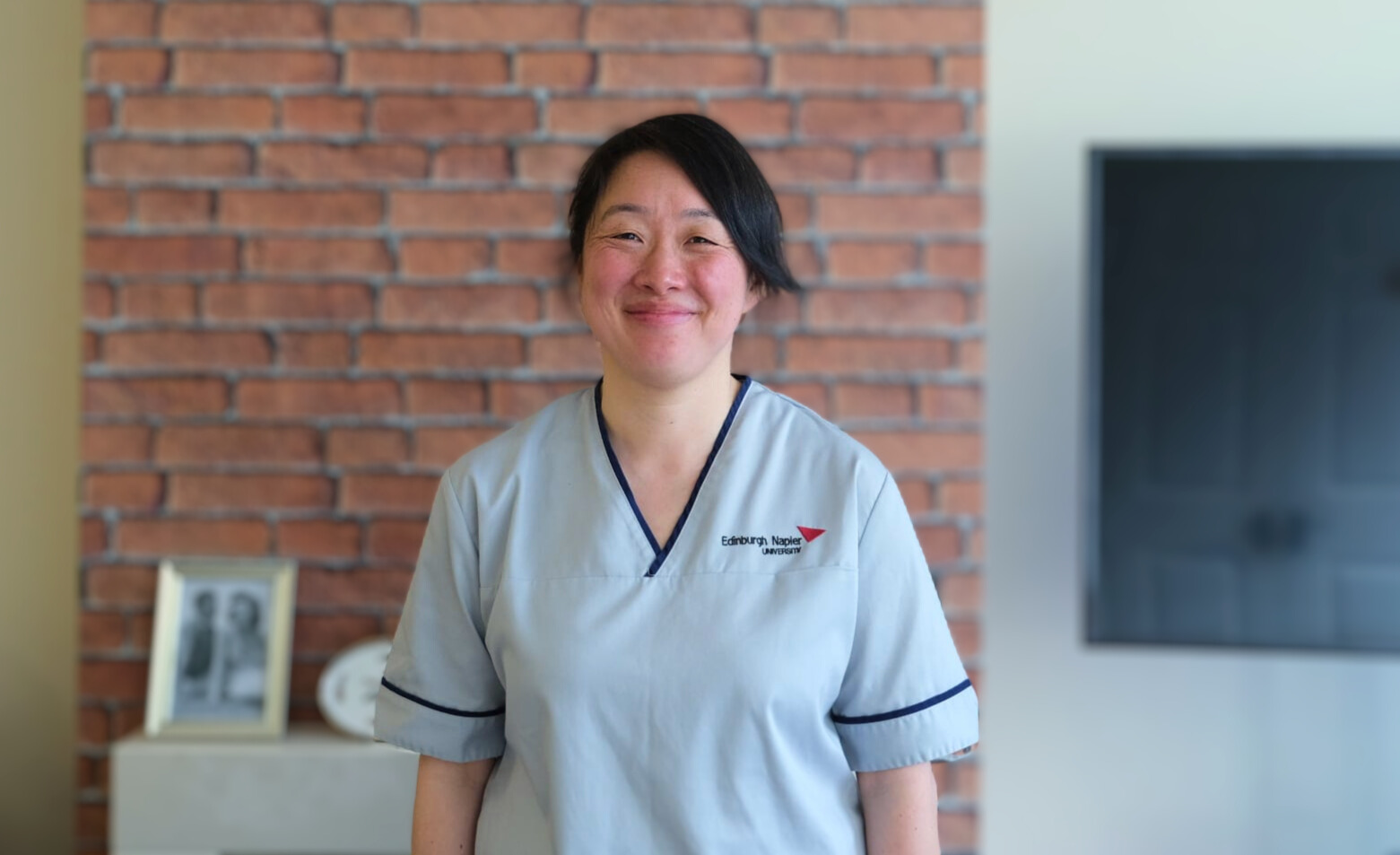Previous
Children's nurse
To become a learning disability nurse, you'll need to complete a pre-registration degree programme accredited by the Nursing and Midwifery Council (NMC).
Imagine a career where you empower people of all ages to live fuller, healthier, and more independent lives. That's the incredible impact you can have if you become a learning disability nurse!
Learning disability nurses are also vital advocates, boosting understanding and awareness within health and social care services.

If you are interested in becoming a learning disability nurse, useful school subjects include:
Speak to your guidance teacher or careers adviser about subjects offered at your school.

You may find it helpful to get some healthcare experience by doing a work placement or volunteering. You will get training, increase your knowledge, and learn new skills. This could help you when applying to college, university, or a new job with NHSScotland.
There are many different pathways to becoming a registered learning disability nurse.
Thinking about becoming a learning disability nurse? Here's a great way to get started! You can apply to do an HNC in Healthcare Practice at college if:
It’s a recognised step that may allow direct entry into the second year of a university degree. It could also help accelerate your progress towards becoming a registered learning disability nurse.
Taking one year to complete, many colleges in Scotland deliver the HNC Healthcare Practice at SCQF level 7:
You can search for college courses on My World of Work.
The Open University (OU) offers learning options for nursing support workers who want to become registered nurses.
Are you a nursing support worker looking to level up your career? The OU’s CertHE in Healthcare Practice at SCQF Level 7 is designed to boost your knowledge and practical skills. It could open the doors to:
Plus, you'll learn online and gain hands-on experience in your current workplace. Curious to find out more? Explore the CertHE in Healthcare Practice with the OU.
The OU offers a 4-year part-time pre-registration BSc (Honours) Nursing (Learning Disability) degree programme at SCQF level 10. You'll combine working in your existing nursing support worker or assistant practitioner role with online study. The distance learning approach also includes local placements that provide hands-on experience and training.
The Scottish Government covers all tuition fees.
Once you graduate, you’ll be ready to register with the Nursing and Midwifery Council (NMC).
Find out more about the BSc (Honours) Nursing (Learning Disability) degree programme.
SWAP supports adult learners returning to education after a break. A one-year SWAP Access to Nursing course provides a supportive route that you can take as your first step towards a career in nursing. It will help to bridge gaps in your education.
Completing the course will prepare you for entry into a SWAP-partnered university undergraduate nursing degree programme. Your tuition fees may be paid, and you could be eligible for a bursary.
If you meet the entry requirements, you can apply to do a Learning Disability Nursing degree, regardless of background or life experience. You could be a school leaver, a college student, or a career changer.
You’ll develop the skills to support people with learning disabilities and positively impact their health and quality of life.
Undergraduate degree programmes take 3 to 4 years to complete full-time. Bursaries are available to support you throughout your studies.
There are 2 universities in Scotland that offer NMC-approved undergraduate degree programmes in learning disability nursing:
For more information, view the programme details on each university's website.
Were you previously registered as a learning disability nurse with the NMC? If you’re thinking about returning to practice, this pathway is the option for you! You’ll need the following before you start your readmission application:
If you're unable to meet the practice hours requirement, you can complete one of the following to update your knowledge and skills:
Find out more about returning to practice as a learning disability nurse.

The Paramedic, Nursing and Midwifery Student Bursary (PNMSB) scheme is managed by the Student Awards Agency Scotland (SAAS) on behalf of the Scottish Government.
It includes a non-repayable bursary of £10,000 that’s not income assessed.
You must meet the eligibility criteria:
Other bursaries or grants may be available depending on your circumstances.
Find out more about SASS funding for nursing and midwifery students.
The NMC is the independent regulator for all qualified nurses and midwives in the UK. When you graduate, you must register with the Nursing and Midwifery Council (NMC). You can then apply as a newly qualified learning disability nurse for vacancies in the NHS.
Ever wondered what makes you a registered professional? This short video from the NMC breaks it down! Discover how the NMC Code and professional standards guide and support you throughout your nursing career.
As a learning disability nurse, you'll work to improve the health and social inclusion of people in your care. Using a diverse range of skills and communication techniques, you'll work with individuals to help them express their needs.
Advocacy plays a crucial role in addressing health inequalities and access to healthcare services. You’ll help to reduce barriers, so people can live full and independent lives. You might also help them gain the skills needed for employment.
Have you cared for a relative or worked in a caregiving role? You may already have the right experience to start a career as a learning disability nurse. This experience will help you support people with learning disabilities in becoming more independent.
You'll also build long-lasting relationships with patients and their families. It's one of the most rewarding things about the role.
As a learning disability nurse, you’ll be a highly skilled professional who is responsible for the decisions made in your role.
Your main tasks could include:
You’ll need these skills:
You’ll work in a team, which could include other health and social care professionals, such as:
You may also work with colleagues and partners in the care sector, independent healthcare sector, third sector, and education.
As a learning disability nurse, you could work in:
Once registered as a learning disability nurse, there are ongoing requirements for education and skills development. You’ll also have lots of opportunities to go further and learn more.
In your first year as a newly qualified nurse, you’ll get extra support and guidance through the Flying Start programme.
In the NHS, you may choose to be a staff nurse throughout your nursing career, keeping up to date through continuing professional development. Taking extra courses and workplace learning could lead to progression through the career pathway to senior, advanced or consultant level.
When you’ve qualified as a registered learning disability nurse, there are lots of specialisms to choose from, including:
Once you've gained experience as a learning disability nurse you could progress to these roles:
You could also combine your nursing training with social care work. There are opportunities to move into:
Revalidation is a process that all nurses need to follow to maintain their registration with the NMC every 3 years. It is an ongoing process throughout your career as a nurse and aims to:
When you become a qualified learning disability nurse, you must register with the NMC to work in the UK. You can also join the Royal College of Nursing.

Discover the skills and qualifications you’ll need for each role and what the work will be like.
Explore careers
We'll guide you through the recruitment process, from applying online to interview preparation.
Help with recruitment